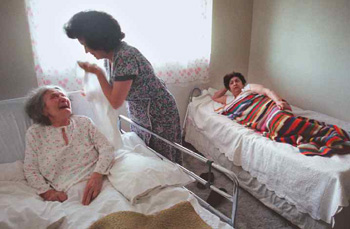
|
When it comes to care,
there's no place like home
Daughter cares for mom in comfort of her own bedroom
By Jim DeBrosse© 1999 Dayton Daily News
BEAVERTON, Ore. -- Inside a sparse, two-bedroom apartment close enough to feel the breeze from the interstate, 89-year-old Arfenik Melkumiants lies peacefully in her bed -- a tiny, wizened woman with bright white hair and alert brown eyes. She is unable to talk or walk because of a devastating stroke two years ago.
Her daughter, Tamara, strokes her forehead and whispers lovingly in her native Russian tongue, Melkumiants' face lights up with an enormous, toothless smile. At that moment there can be no doubt that Melkumiants is happy to be alive, and in the home of her daughter, where she is well
cared for.
 LISA POWELL/DAYTON DAILY NEWS
TAMARA MELKUMOVA (center), an Armenian immigrant, is able to take care of her 89-year-old mother, Arfenik Melkumiants (left) and her ill sister, Jasmin Tsar (right), in her Beaverton, Ore., home. The state of Oregon will pay for a relative to take care of a family member at their home.
LISA POWELL/DAYTON DAILY NEWS
TAMARA MELKUMOVA (center), an Armenian immigrant, is able to take care of her 89-year-old mother, Arfenik Melkumiants (left) and her ill sister, Jasmin Tsar (right), in her Beaverton, Ore., home. The state of Oregon will pay for a relative to take care of a family member at their home.
|
Tamara Melkumova, 53, receives $426 a month for her mother's room and board plus a care payment of $1,088 per month and some supplies -- enough money that Melkumiants was able to quit her job as a bookkeeper and devote herself to her mother and her older sister Jana, who suffers from back problems and depression.
The cost of her in-home care, at the state's highest level of reimbursement, is less than half the $3,875 per month the state would have paid for her skilled care in a nursing home.
"Taking care of her mother at home is much cheaper for the state and the taxpayers, and more fun for the client," said Mary Lang, the family's case manager. "You can see she's happy. She fills the time."
Melkumova is especially pleased because she feared her mother would have died if left in a nursing home. There she was losing weight rapidly and becoming increasingly confused, in part because no one at the home spoke Russian. Doctors gave her 10 more days to live when Melkumova took her home.
That was two years ago, and now her mother takes food by mouth, a liquid nutritional supplement that her daughter usually gives to her in a favorite Mickey Mouse cup. Her daughter also changes her diapers and bed linens, checks her blood sugar, administers her heart medication and sits her up in her wheelchair several times a day to prevent bedsores and other complications.
"Here, every day, she get better and better and better," her daughter announces proudly in her somewhat limited English. "See. She has no skin problems."
Melkumova and her mother are refugees from the Armenian sector of the old Soviet Union.
Lang says that Melkumiants would never have gotten such individualized care in a nursing home. "In a nursing facility, (the family) just couldn't get her up in a wheelchair when they wanted to. They would have to wait for staff to come around. If she were in a nursing home, she would have a lot of skin problems."